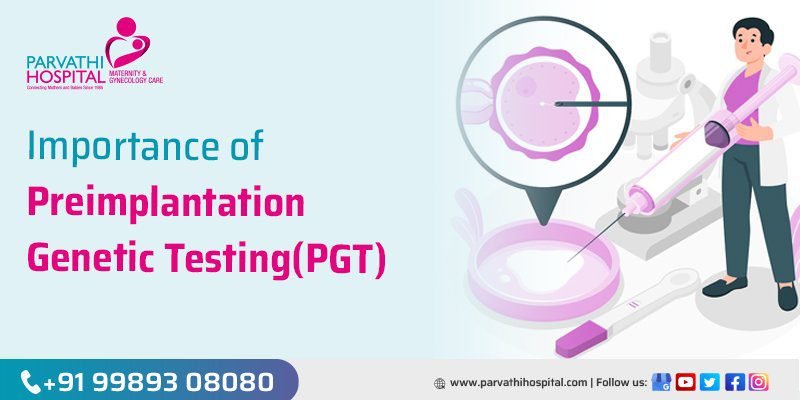Subtotal $0.00
Importance of Preimplantation Genetic Testing (PGT): Types, Benefits, Costs and Risks
In the realm of modern reproductive technology, Preimplantation Genetic Testing (PGT) emerges as a groundbreaking advancement, potentially revolutionizing family planning and reshaping the future of genetic health. As science unravels the intricate intricacies of human genetics, PGT stands as a beacon of hope, offering invaluable insights into embryos’ genetic makeup before implantation. Visit Parvathi hospitals, the best gynecologists in Hyderabad to undergo a safe PGT.
In this comprehensive guide, we delve into the multifaceted world of Preimplantation Genetic Testing – exploring its various types, delving into its far-reaching benefits, examining the costs involved, and addressing the inherent risks accompanying such an intricate procedure.
What is Preimplantation Genetic Testing?
Fertility specialists perform these tests for two key reasons. One is to check for genetic abnormalities in embryos, frequently resulting in failed implantation, miscarriage, and unsuccessful IVF. The second is to find embryos with genetic flaws that could cause a child to acquire diseases like muscular dystrophy or fatal genetic disorders. Such defects prevent embryos from being implanted to become pregnant in the mother’s womb. Genetic mistakes in embryos significantly contribute to unsuccessful pregnancies and live births.
Types of PGT Treatments
1. Preimplantation Genetic Testing for Aneuploidies:
Aneuploidy, which is used to define any embryo with either too many or too few chromosomes, is recognized by PGT-A. Down syndrome is brought on by one type of aneuploidy, while other chromosomal variations may result in up to 60% of miscarriages or completely preclude pregnancy.
2. Preimplantation Genetic Testing for Monogenic/Single-gene disorders:
PGT-M screens for monogenic (single gene) diseases such Cystic Fibrosis, Huntington’s disease, Sickle Cell Anemia, muscular dystrophy, and hemophilia. This screening is crucial for people who are aware that their relatives have the defective gene.
3. Preimplantation Genetic Testing for Chromosomal Structural Rearrangements:
When a parent is known to carry a chromosomal alteration, such as a translocation or inversion, PGT-SR searches for structural rearrangements. These may result in embryos having excess or missing chromosomal material.
Benefits of PGT
Better Selection of Embryo
PGS aims to raise the possibility that the embryo(s) you’ve chosen will result in a fruitful, healthy conception for your future family. PGS testing shortens the time it takes to get pregnant, minimizes the need for several embryo transfers, and lowers the risk of miscarriage. Even while PGS frequently incurs additional costs, it can frequently lower the overall cost of your IVF process by reducing the number of transfers required to become pregnant.
Prevents Transmission of Genetic Diseases:
PGS/PGT-A examines chromosomal anomalies, such as the number and position, rather than diagnosing specific diseases. Your fertility specialist can choose chromosomally normal embryos and exclude any that would compromise a safe birth by running PGS/PGT-A on your viable embryos, even if they first appear to be of excellent quality. However, preimplantation genetic diagnosis (PGD) is a better choice for you if one or both intended parents have a genetic condition like cystic fibrosis that is well recognized.
Quicker Pregnancy Time
Your fertility clinic can use PGS/PGT-A to transfer the healthiest embryos first, preventing failed embryo transfers. Knowing which embryos will aid in a full-term pregnancy will help you avoid wasting months on embryo transfers that won’t result in a healthy pregnancy and delivery.
Learn About Your Fertility Treatment Options:
You should be ready for the chance of genetically defective embryos during PGS, meaning that your fertility specialist won’t be able to transfer them to the uterus. Even if this is tragic, your medical professionals will help you come up with the best course of action and get you back on track for a successful, healthy conception and pregnancy.
Who Needs to Undergo PGT?
Preimplantation genetic testing typically increases the probability of giving birth to a child with a congenital disease. Numerous factors can contribute to increased risk.
Women over 35 are more likely to give birth to a child with an abnormally high or low number of chromosomes. Preimplantation genetic testing is frequently carried out throughout IVF when women in certain high-risk groups try to conceive.
Preimplantation genetic screening can help ensure that only embryos with a full complement of chromosomes are implanted. Even when they are healthy, some people carry hereditary illnesses. Carriers have the chance of giving birth to a child who has a fatal disease. Often, carriers can conceive naturally, but they choose IVF because it enables embryo preimplantation genetic diagnosis (PGD).
Because they have a genetic condition, some parents get preimplantation genetic testing. It may be challenging for parents to conceive or terminate a pregnancy due to certain diseases. Others result in later-life conditions that are potentially fatal. Many of these parents decide on IVF, like carriers, because it enables genetic testing.
Final Words
In conclusion, Preimplantation Genetic Testing (PGT) emerges as a remarkable milestone in reproductive technology, offering profound implications for individuals and couples seeking to build healthy families. As we have explored the various types of PGT, uncovered its benefits, dissected the associated costs, and confronted the potential risks, it becomes evident that PGT is a powerful tool that empowers prospective parents with knowledge and choices.
PGT represents a pivotal thread that weaves the realms of science, medicine, and the profound desire for healthy and thriving families. As this technology evolves, its significance will continue to grow, shaping how we navigate the intricate path of genetics and parenthood, ultimately enriching lives and paving the way for a future where the gift of life is embraced with greater understanding and empowerment.


Comments are closed